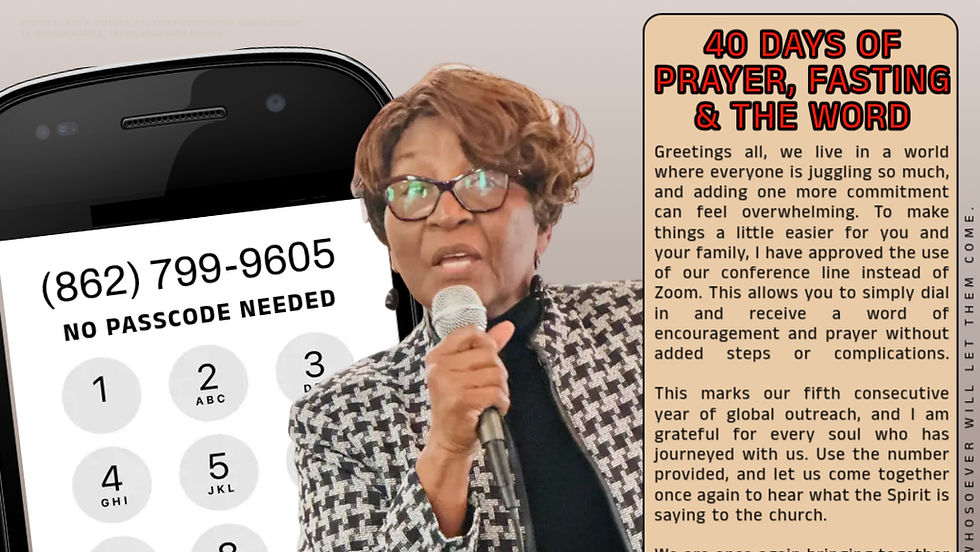Why Fellowship Matters in Strengthening Faith Communities
- NORTH CAROLINA DIOCESE

- May 20, 2025
- 4 min read
Fellowship forms the backbone of many faith communities, providing a space where individuals can come together, share their beliefs, and support each other on their spiritual journeys. At its core, fellowship creates a nurturing environment that enhances relational bonds among members. In this blog post, we'll delve into the significance of faith fellowship, its impact on personal spiritual growth, and practical ways to foster a vibrant community.

Faith Fellowship
Faith fellowship is more than just a social gathering; it is an intentional act of connecting with others who share similar beliefs. It allows individuals to express faith through shared worship, prayer, and communal activities. This engagement can lead to deeper relationships and understanding within faith communities.
Studies have shown that people who regularly engage in fellowship-based activities report higher levels of happiness and fulfillment. According to a survey conducted by the Pew Research Center, over 70% of individuals engaged in church activities felt more connected to their community compared to those who do not participate. This connection is vital for emotional well-being and reinforces the importance of regular fellowship.
One of the best ways to enhance faith fellowship is by organizing events that encourage group interaction. For instance, hosting potluck dinners can create a relaxed atmosphere for people to foster relationships. These events offer unique opportunities to share stories, testimonies, and prayers, enriching the community experience.

The Benefits of Faith Fellowship
Fellowship offers numerous benefits that extend beyond social interactions:
Emotional Support: Life can bring challenges, and having a supportive community is crucial for getting through tough times. Fellowship allows individuals to seek comfort and encouragement from others.
Spiritual Growth: Participating in a faith fellowship can inspire individuals to deepen their understanding of their beliefs. Through shared discussions, prayer, and study, members can grow in their faith together.
Accountability: Being part of a fellowship encourages members to hold each other accountable in their spiritual practices. When individuals know they are supported by a community, they are more likely to stay committed to their faith journey.
Outreach and Service: Faith fellowships often encourage members to reach out to their local communities. Collaborating on service projects not only strengthens the bonds among members but also positively impacts the wider community.
To illustrate, consider a church group that regularly volunteers at a local soup kitchen. The fellowship not only serves those in need but also allows the members to bond through shared experiences, reinforcing their connection.
What is the Meaning of Christian Fellowship?
Christian fellowship is a vital component of any vibrant church or faith-based community. At its essence, it embodies the idea of coming together in unity, guided by shared beliefs and values. The act of fellowship includes not only the social aspects of meeting and sharing meals but also the spiritual practices of worship and prayer.
Christian fellowship is often highlighted in the Bible, particularly in verses such as Hebrews 10:24-25, which encourages believers to spur one another on toward love and good deeds and not to give up meeting together. This scripture emphasizes the importance of gathering as a community to support and uplift one another in faith.
Fellowship can manifest in various forms, including small group meetings, Bible studies, and community events. Each form provides unique opportunities for bonding and spiritual growth. By participating actively, members cultivate a sense of belonging and mutual support, which is essential in strengthening the faith community.

How to Foster a Spirit of Fellowship
Creating a true spirit of fellowship within a faith community takes intentionality and effort. Here are some practical steps to foster deeper relationships among members:
Regular Meetings: Schedule regular gatherings, such as weekly Bible studies, prayer meetings, or social events. Consistency helps cultivate familiarity and encourage attendance.
Diverse Activities: Include a variety of activities to cater to different interests. Family-friendly events, service projects, or retreats can engage members of all ages and backgrounds.
Encourage Participation: Invite members to take an active role in organizing events or leading discussions. By giving everyone a stake in fellowship activities, you empower them to contribute meaningfully.
Create an Inclusive Environment: Ensure that all members feel welcomed and valued. Being sensitive to different backgrounds and experiences fosters a sense of belonging and unity.
Utilize Technology: For those unable to attend in person, consider hosting virtual meetings or online groups. This option can help keep the fellowship alive even when physical attendance isn't possible.
Through commitment to these practices, faith communities can build strong connections among their members, leading to a thriving fellowship.
The Lasting Impact of Fellowship
The impact of deepened fellowship within faith communities is profound and can affect various aspects of members' lives. Not only do individuals grow spiritually, but they also develop meaningful relationships that often extend beyond their church walls.
Imagine a new member of a faith community attending their first fellowship event. Feeling apprehensive, they're quickly welcomed with smiles and introductions. As they engage in discussions and activities, they start forming relationships that provide a sense of belonging. Over time, the connections they build lead to friendships that support them in moments of need and joy alike.
These relationships often inspire members to become more engaged in their community, whether through volunteering, leading study groups, or mentoring others. When people feel connected, they are more likely to invest their time, energy, and resources back into their communities, creating a positive cycle of growth and support.
In the end, nurturing fellowship within faith communities is not just about personal relationships; it's about building a resilient and supportive network where each individual can thrive in their faith journey. For more insights into the importance of christian fellowship, explore the resources available and consider how you can strengthen the bonds within your own community.







Comments